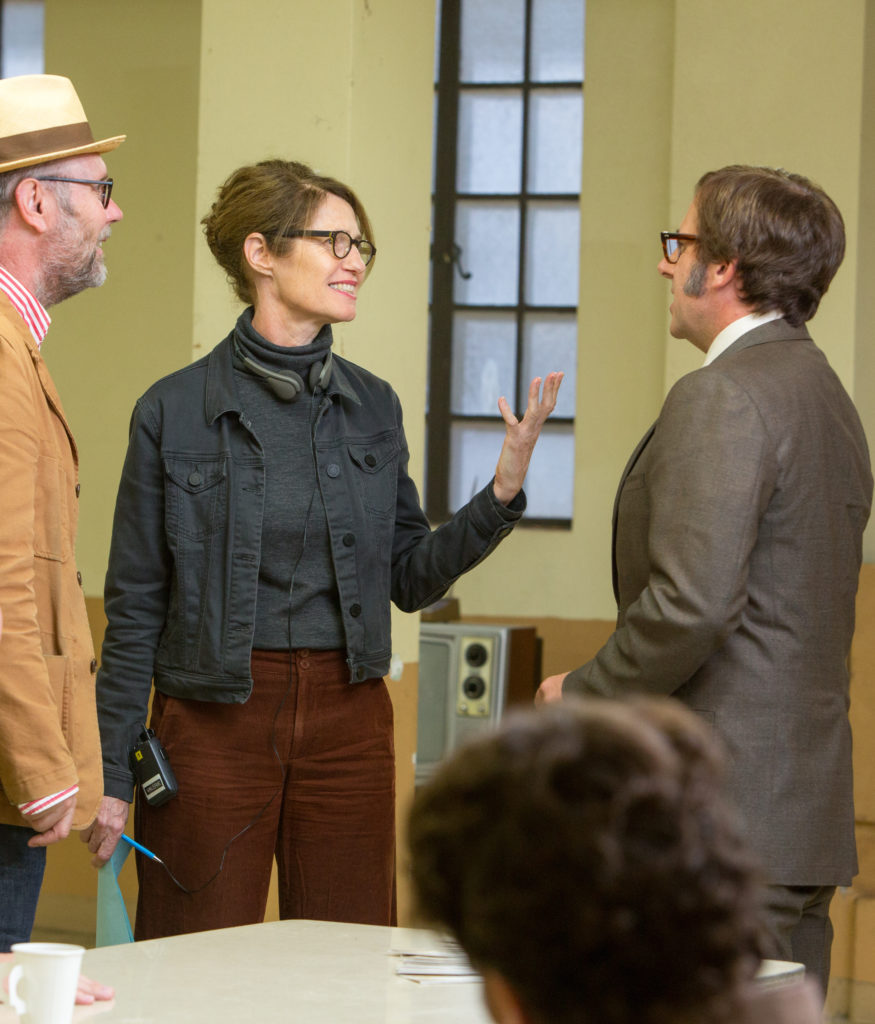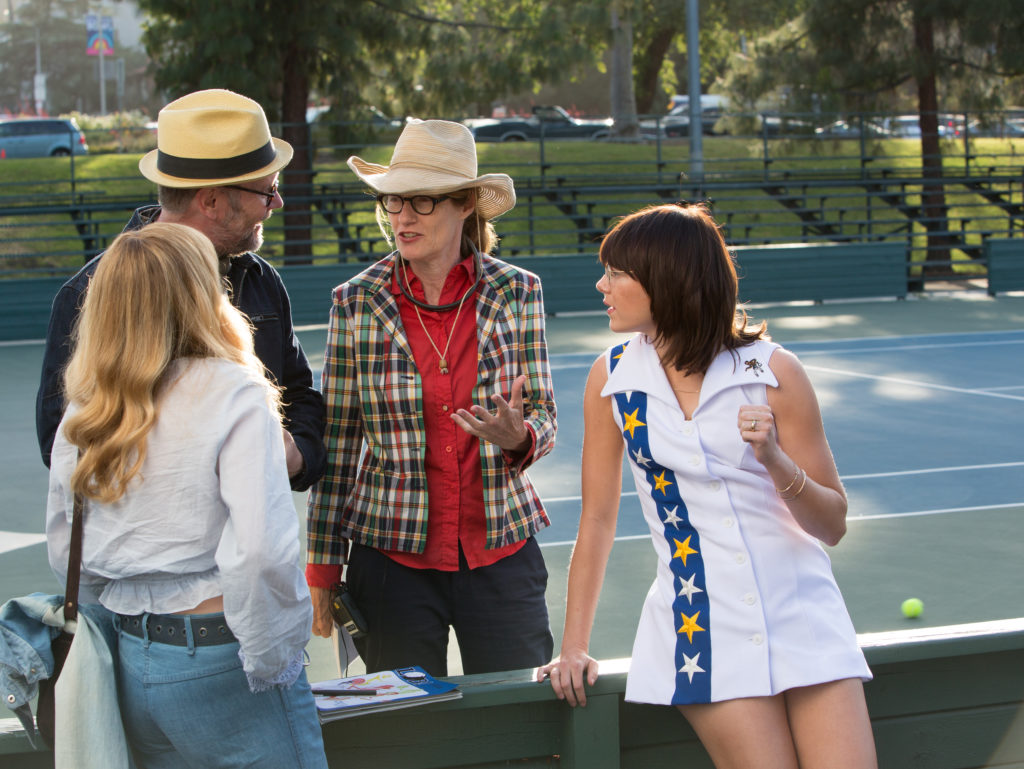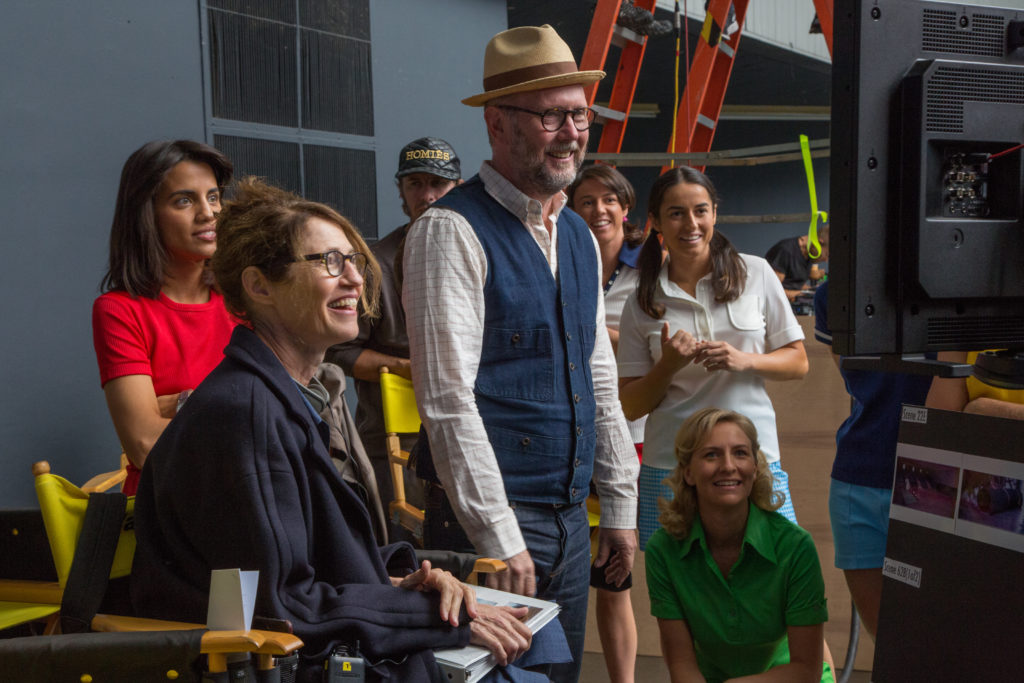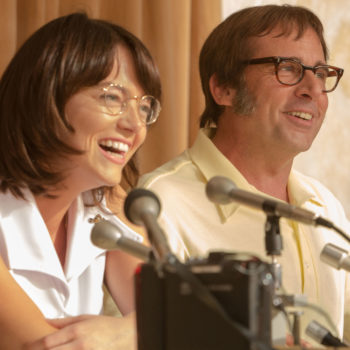Valerie Faris and Jonathan Dayton started out as rock video auteurs, co-directing classic clips like Extreme’s “More Than Words.” They leapt to the big screen with “Little Miss Sunshine” — which was nominated for a Best Picture Oscar.
Their new film is “Battle Of The Sexes.” A dramedy about the real-life, 1973 tennis match between women’s champion and feminist Billie Jean King, played by Emma Stone and the chauvinist former men’s champion Bobby Riggs, played by Steve Carrell.
When Rico spoke to Jonathan and Valerie, he started things by asking what attracted them to this story, and why now.

Jonathan Dayton: It was interesting. There were three different versions of this story all rushing to production when we started. And when we cast Steve and Emma that sort of-
Rico Gagliano: You won.
Jonathan Dayton: …Killed the other two. We won. We won that battle.
Valerie Faris: Yeah. But it was 2015 when we started on this. And we were heading into the election, and we were pretty sure Hillary was going to be running against a man. So I think it was just in the air.
And the reason we wanted to tell this story and tell it the way we told it is that there was so much about their personal lives that we didn’t know and that shocked us. All that she was going through — and what both of them were going through — while that was going on just kind of blew our minds.
Rico Gagliano: I will say, Billie Jean King is obviously a hero as an athlete, and as a person, and as an activist. So what surprised me most watching this was actually how much effort you and your screenwriter, Simon Beaufoy, put into making Bobby Riggs a sympathetic human being. Especially since he spent so much effort making himself into this total caricature of a boorish male. What was hardest about that for you?
Jonathan Dayton: Well, we didn’t want to discount the chauvinism that was there on some level. But there was much more to Bobby Riggs than his public bluster. It was interesting to us that at 55, he felt the world had passed him by. He was a champion when he was very young, and won the Triple Crown at Wimbledon in 1939. And then the war broke out, so he kind of missed out on his moment in the spotlight.
So, as a middle aged man working in his wife’s father’s business he felt-
Valerie Faris: Trapped and-
Jonathan Dayton: Obsolete.
Valerie Faris: Yeah. I think also getting to know Billie Jean, she had a lot of love for Bobby, I think, even at the time. She grew up watching him play and she respected him. She could see through his kind of clown act. And she understood why he was doing it. He wasn’t the real opposition.

Rico Gagliano: It’s true. The real opposition — the villain, in your movie anyway here — is Jack Kramer, who’s the head of the Tennis Association, who to me represents institutional sexism.
Jonathan Dayton: Exactly. And even there we cast Bill Pullman in that role who has played presidents and is a more-
Rico Gagliano: He defeated the aliens! He saved us from aliens.
Jonathan Dayton: [Laughs.] Yeah, yeah he saved us from aliens. But now presidents aren’t the same heroic figures. But, yes, he clearly is the voice of the times.
Valerie Faris: But still a human being. And I think Billie Jean tells a story, it was Wimbledon where Jack Kramer, toward the end of his life, was at Wimbledon in a wheelchair. And she hadn’t really been in close contact with him over the years, but she went down and gave him a big hug and kiss.
I think what’s so incredible about her is I think she just always looks for the good in people and in her opponents as well. And we took our cues from her, really.
Rico Gagliano: Yeah that’s something that I found really endearing about her character — especially watching this film at this time of very angry identity politics — is her sense of humor. And she can laugh with Riggs and even like him despite all the chauvinist gender bashing. To what extent were you thinking about that attitude as a comment on modern-day identity politics?
Valerie Faris: Well, I mean, we tried not to get into the fray… to a certain degree. I mean-
Rico Gagliano: I think you’re kind of in it regardless.
Jonathan Dayton: Oh no, exactly.
Valerie Faris: But I do think that she’s been so effective in her activism. And I think part of what’s made it work is the way she approaches politics and the opposition. She’s not calling people names or reducing people to one note.
Rico Gagliano: Actually, let’s talk about her a little bit more. This is the first time you’ve had a real person as a protagonist in one of your films. And, obviously, you met her during production. What quality of her was most important for you to capture? Was it the humor? What?
Jonathan Dayton: Well, Billie Jean at 73 is very different from the person she was at 29. She is first to point out that it was an incredibly confusing time for her. But-
Rico Gagliano: She was married to a man, for those who don’t know.
Jonathan Dayton: She was, she was married to a man and having her first relationship with a woman.
Valerie Faris: And that was something we wanted to portray was just how hard it was to sort through her sexuality when she, you know, coming from a very conservative, homophobic family, parents.
Rico Gagliano: Oh! I did not know that.
Valerie Faris: Yeah, she talks about herself being homophobic.
Rico Gagliano: Really?
Valerie Faris: So I think she was–yeah, it was very hard for her to acknowledge that part of herself. And with all that was going on, I think it was… it must have been really scary because she had so much at stake. She had a lot to lose.

Rico Gagliano: I think of this in relation to your other two films: “Little Miss Sunshine,” about a little girl’s beauty pageant; “Ruby Sparks,” which is about a guy’s misguided fantasy of the perfect woman. And it occurs to me they’re all about taking on, and to a certain extent, rejecting the standard concept of womanhood, what it means to be a woman. And I can’t-
Valerie Faris: [Laughs] I like that.
Rico Gagliano: You’re welcome! And I can’t help but think that you’re a couple, one of whom is male, and that’s an interesting theme you keep returning to. Why do you?
Jonathan Dayton: Well it’s certainly not a conscious thing. But there is obviously an interplay between the two of us that is always in effect and I don’t approach it “as a man.” But it’s certainly part of my makeup and-
Valerie Faris: And I think it’s just so much what we’re facing all of the time. I mean maybe-
Rico Gagliano: As a team you mean?
Valerie Faris: Well, as a team, and then as a society-
Jonathan Dayton: As a culture.
Valerie Faris: As a culture, you know, just gender equality, and equality in general. But I think in terms of gender, we experience it or I experience it very differently in our industry because I have a male partner. So sometimes maybe that gives me a different perspective than I think most female directors. I still have experienced the sexism over the years, but-
Rico Gagliano: Do you think that’s maybe why your films are taking on these issues, but when I think of them, I think of them as lighthearted. I don’t think of them as angry films.
Valerie Faris: They’re, they’re definitely not angry [laughs]. That’s not what we gravitate to. There’s nothing wrong with that. But so much I think, of what we do comes from a love of the characters and a compassion for the characters.
Rico Gagliano: You obviously have a great time reconstructing 1970s America with all its insane fashion and hairstyle glory. You were teens in the ’70s I believe. What aspect of that time were you most excited to recreate?

Valerie Faris: Ted Tinling’s tennis dresses were kind of outrageous and that was really fun getting to recreate those. I mean, even just the extras. It was so much more fun than the usual fare with extras. So-
Jonathan Dayton: Yeah, we had 250 extras and we had to handpick each one because you don’t want obvious plastic surgery, or an aerobicized body. And so they were as much the sets as anything. But we also didn’t want to get too cute in our depiction of the ’70s. We tried to approach it as if this were a contemporary movie.
Valerie Faris: As if we were making it in 1973. And we sort of realized like, people in 1973, a lot of their clothes were from 1968 or 9. So we really did mix up the period. And different aged people had, like, whatever the style was when they were 25 is what they wear for the rest of their lives.
So, just kind of playing with that. And Mary Zophres, our costume designer, is incredible, and down to the undergarments.
Jonathan Dayton: Yeah the undergarments actually-
Rico Gagliano: What?
Jonathan Dayton: Were all period undergarments.
Rico Gagliano: Come on!
Valerie Faris: Oh yeah. You gotta have the Playtex “Cross Your Heart” bra.
Jonathan Dayton: All period. And I even took a picture when we first went to the costume room because there were just racks and racks of these sort of brownish, very unappealing, period undergarments.
Valerie Faris: Used undergarments [laughs].
Rico Gagliano: Oh the glamour of Hollywood.
Valerie Faris: Creepy.
Jonathan Dayton: Yes. Try not to think about that watching the movie.


